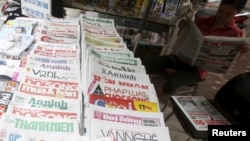One day after Danang authorities issued guidelines requiring the local press to obtain official approval before disseminating content, city officials rescinded the order in the face of public outcry.
Vietnamese media reported that along with the withdrawal of the censorship request, the Danang Department of Information and Communications also “sincerely apologized to the press.”
The directive — dated Tuesday, issued Wednesday and rescinded Thursday — told the Danang newspaper and the Danang police newspaper to “coordinate and submit news and reports before printing and distribution.”
The communications department told radio and television stations to “coordinate and submit breaking or important stories that need responses from local departments” in a timely manner.
Danang authorities also targeted national news organizations and those of other provinces based in the city, telling them to “provide links of major stories about Danang that need response from local departments.”
Online backlash
The directive went viral. Journalists and the public shared it, saying that Danang “has a law of its own” and questioning its legitimacy. Online commented ranged from “ridiculous” to “beyond imagination.”
Veteran journalist Vo Van Tao told VOA Vietnamese that while authorities at all levels of government still want to control the press, the Danang “incident” was partly a personnel issue, reflecting what he called “poor” staffing.
“Children of powerful officials are promoted, people with money can buy seats, though some of them have no knowledge, some use fake degrees, etc., so, that is why once in a while, we see crazy directives like this one.”
In Tao’s opinion, the directive was “too backward.” In the past, Vietnam has had press controls, but Tao said he “felt very shocked, very surprised” by Danang’s move.
Self-censorship
With nearly two decades of journalism experience, Tao added that in the past 30 years, the Vietnamese government has replaced the system of central censorship with one of self-censorship at individual news organizations.
He clarified that this means editorial boards at news organizations decide for themselves what content to publish. But if regulators like Vietnam’s Ministry of Information and Communications, the government’s cultural security agency, or the Propaganda Committee of the Communist Party are “unhappy” about certain published news items or reports, authorities will “reprimand, warn or fine” the news outlets, he added.
Officially, Vietnam’s 1992 constitution recognizes freedom of expression, but the nation’s criminal code prohibits speech that is critical of the government, which is led by the Communist Party of Vietnam (CPV).
“The definition of such speech is vaguely worded and broadly interpreted,” according to Freedom House, which monitors press freedom worldwide.
In April 2016, Freedom House reported that “the National Assembly passed an ambiguous media law, which took effect in 2017, that banned prepublication censorship of print and broadcast media and criminalized threats or other actions that interfere with journalistic activities, among other provisions, but also introduced several vaguely worded new offenses that could be used to punish journalists.”
And the organization’s 2017 report noted, “The authorities have increasingly cracked down on citizens’ use of social media and the internet in general to spread uncensored information and galvanize dissent.”
But the reaction of Danang citizens and journalists to the Feb. 6 directive seemingly galvanized the city’s Department of Information and Communication to rescind its directive. Vietnamese media reported Thursday, just after the department withdrew the directive, that authorities acted because they found it “does not comply with the provisions of the Press Law.”
The government’s quick response shows “that the authorities know how to listen to the reactions of the public,” Tao said. “But if they had not, I believe their superiors would also ask them to withdraw it. If the community, and the public react strongly, the highest government authorities at the central level see that something is unacceptable, and consequently, they would also have asked Danang to withdraw it.”




